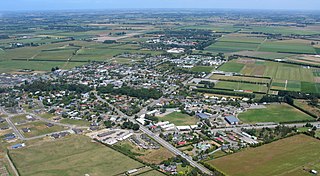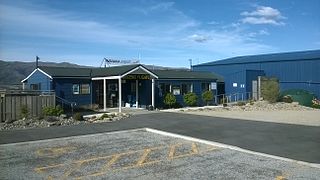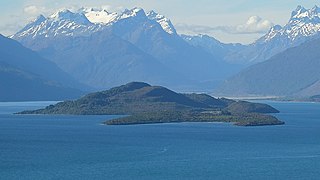
The Council of Europe is an international organisation with the goal of upholding human rights, democracy and the rule of law in Europe. Founded in 1949, it brings together 46 member states with a population of approximately 675 million as of 2023; it operates with an annual budget of approximately 500 million euros.

Lincoln is a town in the Selwyn District, in the Canterbury Region of New Zealand's South Island. The town is located on the Canterbury Plains to the west of Banks Peninsula, 22 kilometres southwest of Christchurch. The town has a population of 10,250, making it the second largest town in the Selwyn District behind nearby Rolleston.

Wānaka is a popular ski and summer resort town in the Otago region of the South Island of New Zealand. At the southern end of Lake Wānaka, it is at the start of the Clutha River and is the gateway to Mount Aspiring National Park.

A recreational vehicle park or caravan park is a place where people with recreational vehicles can stay overnight, or longer, in allotted spaces known as "sites" or "campsites". They are also referred to as campgrounds, though a true campground also provides facilities for tent camping; many facilities calling themselves "RV parks" also offer tent camping or cabins with limited facilities.

The Victoria University of Wellington Students' Association (VUWSA) is the official student association at Victoria University of Wellington, New Zealand. VUWSA was established in 1899 as the Victoria University College Students' Society.

Wānaka Airport is an airport serving the rural town of Wānaka in Otago, New Zealand. The airport currently has scheduled commercial flights from one airline, SoundsAir, with Air New Zealand having ceased flights to the airport in 2013. It largely serves as a base for scenic and charter flights to destinations such as Milford Sound and Mount Aspiring National Park. The airport is located beside State Highway 6, on a plateau above the small village of Luggate, and is 10 km south-east of Wānaka township. It was originally a private airstrip owned by Tim Wallis, but in 1985 it became the main commercial airport for Wānaka, replacing Mount Iron Aerodrome.

Popular Front of India (PFI) is an Islamic political organisation in India, that engages in a radical and exclusivist style of Muslim minority politics. Formed to counter Hindutva groups, it was banned by the Indian Ministry of Home Affairs under Unlawful Activities (Prevention) Act (UAPA) on 28 September 2022 for a period of five years.

There are numerous gangs in New Zealand, of varying criminality, organisation and ethnicity, including outlaw motorcycle gangs, street gangs and ethnically based gangs. A chapter of the Hells Angels motorcycle club was formed in Auckland in 1961, the first Hells Angels chapter outside the US. Soon after, the Mongrel Mob formed in Hastings and Wellington, developing into a predominantly Māori and Pacific Islander gang, and having the largest membership in the country. Through the 1960s and 1970s, other outlaw motorcycle clubs and ethnically based gangs formed, including another predominantly Māori gang, Black Power, which grew to rival the Mongrel Mob.

Young Labour is the combined youth wing and student wing of the New Zealand Labour Party. It hosts an annual conference and holds a range of additional national events, including fringe sessions at the Labour Party's annual conference. All Labour Party members aged between 15 and 29 years old are members of Young Labour.

The Camping and Caravanning Club is a not-for-profit membership organisation for camping and caravan enthusiasts in the United Kingdom. It was founded in 1901, and has over 730,000 members.

Camping is a popular activity for both New Zealand residents and for some of the two million foreign tourists arriving every year. Campsites of different standards, generally in conjunction with other forms of accommodation, are offered by holiday park operators throughout New Zealand. The facilities at these campsites vary from just a basic toilet to a full range of camp ground amenities.

The Organisation for Economic Co-operation and Development is an intergovernmental organisation with 38 member countries, founded in 1961 to stimulate economic progress and world trade. It is a forum whose member countries describe themselves as committed to democracy and the market economy, providing a platform to compare policy experiences, seek answers to common problems, identify good practices, and coordinate domestic and international policies of its members.

Pigeon Island / Wāwāhi Waka is an island in the northern reaches of New Zealand's Lake Wakatipu, near the township of Glenorchy. It is 170 hectares in size and is the largest island in the lake. In 1884, during Queen Victoria's reign, it was gifted by the Crown as a reserve to the people of Queenstown district for their use and enjoyment.

The Base is a white supremacist and neo-Nazi accelerationist paramilitary group and training network, formed in 2018 by Rinaldo Nazzaro. It is active in the United States, Canada, Australia, South Africa, and Europe, and designated as a terrorist organization in Canada, the United Kingdom, Australia, New Zealand, and the European Union.
There have been several COVID-19 protests in New Zealand held since 2020, where people protested the government's response to the COVID-19 pandemic in New Zealand, in particular the lockdown measures in place in March–May 2020, August 2020, and August–November 2021 and the later vaccine mandates. The protests have been largely condemned by members of parliament, as well as local city and regional councils. Fears were also raised about the protests increasing the spread of the virus.

COVID-19 vaccination in New Zealand began on 20 February 2021, and will continue throughout the pandemic with the goal of vaccinating all willing New Zealanders aged 5 or older. Those aged 5 to 11 require a parent, caregiver or legal guardian accompany them to their appointment and provide consent for them to be vaccinated. As of 1 September, anyone in New Zealand, regardless of their immigration status, is eligible to be vaccinated.

Susan Jane Grey is a political figure and environmental lawyer in Nelson, New Zealand. She is the co-leader of the NZ Outdoors & Freedom Party and of Freedoms NZ. She is known for promoting medicinal cannabis rights and opposing COVID-19 vaccination, 5G technology, and the use of 1080, frequently sharing misinformation on social media about the effectiveness of COVID vaccination.
The New Zealand Free Speech Union (FSU) is an organisation that advocates for freedom of speech. It was formed as the Free Speech Coalition in 2018 and relaunched as the Free Speech Union in 2021.

The 2022 Wellington protest was an anti-mandate and anti-lockdown occupation of the grounds of Parliament House and Molesworth Street in Central Wellington during the peak of the COVID-19 pandemic. The occupation spring boarded off the New Zealand Convoy 2022, a mass convoy of vehicles that made its way from the top of the North Island and the bottom of the South Island to Parliament starting on Waitangi Day and arriving three days later on 9 February. The occupation lasted just over three weeks. At its peak, the protest spread over a large area of Thorndon and into Pipitea with approximately 1,000 participants. Protesters blockaded areas around the parliamentary grounds with their vehicles and occupied the lawn and surrounding areas in tents. Some associated with the protests harassed bystanders, and disrupted local businesses. The protest was forcibly ended by police on 2 March 2022, and the protesters had none of their demands met by the Government.

TJB 2021 Limited, more commonly known by its trade name Voices For Freedom (VFF), is a company with a special interest in the anti-vaccine movement in New Zealand. VFF was formed in December 2020 to oppose the New Zealand Government's COVID-19 response and vaccination rollout. Despite its non-profit appearance in communications, VFF is registered as a limited liability company and is not legally recognised as a non-profit entity.


















